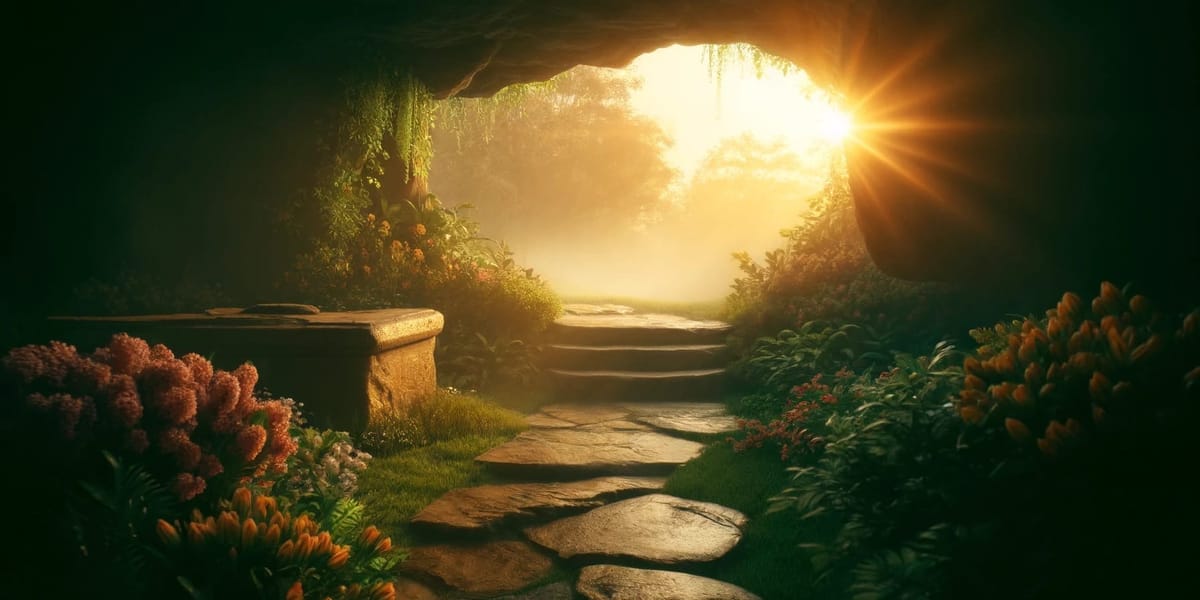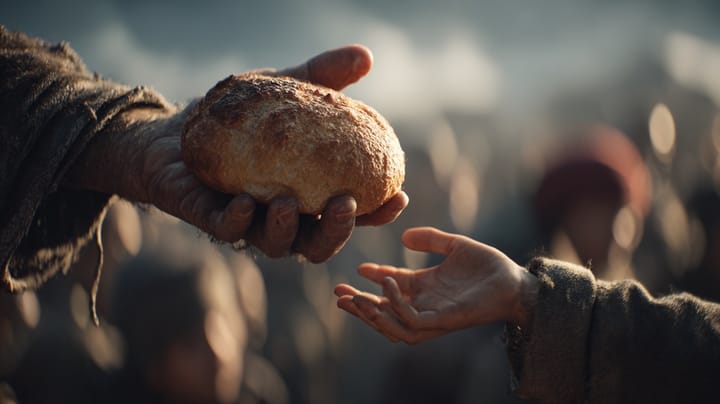Fairhaven Sermon 4-14-2024
Rev. Parson explores Jesus' tangible resurrection, emphasizing its profound implications for life after death and all of creation's renewal.

In this week's sermon Rev. Dylan Parson reflects on a deeply moving scriptural moment when Jesus appears to his disciples after His resurrection, profoundly challenging their understanding of mortality and the divine. As the disciples hide, fearing persecution following Jesus' crucifixion, they are suddenly confronted by Jesus himself, who appears among them offering peace and challenging their fears. This narrative is set against the backdrop of similar testimonies from others who encountered the risen Jesus, particularly during an eventful journey to Emmaus where Jesus was recognized in the breaking of bread. The initial terror and disbelief of the disciples, juxtaposed with their gradual realization of Jesus' tangible presence, underscore the profound and unsettling nature of witnessing a resurrection firsthand.
Rev. Parson explores the theological and existential implications of this narrative, emphasizing the physical reality of Jesus’ resurrection as he interacts with his disciples, demonstrating his physicality by eating before them. This tangible aspect of the resurrection is a cornerstone of Christian faith, promising not just spiritual continuity but a complete, tangible life after death. This promise extends beyond Jesus to all of creation, suggesting a future where all things are renewed and exalted. Rev. Parson concludes his sermon by reflecting on the broad and inclusive nature of resurrection, touching on both personal and cosmic scales of transformation and redemption, encapsulated in the Christian hope and faith reaffirmed weekly in the Apostles' Creed.
Transcript
You have to empathize with the disciples as we meet them this morning in our gospel reading in Luke. They're seeing something very unexpected. They're minding their own business, having a conversation, and Jesus shows up among them. Of course they're going to be scared.
So just to give you a little bit more of an anchor to understand what's going on here in our reading, we begin in some sort of private place in Jerusalem where the 11 apostles, the 12 minus Judas, have gathered together. Presumably they're still in hiding in the wake of Jesus' arrest, crucifixion, and death. It's a very dangerous moment still. And they're speaking with some guests that have shown up, other followers of Jesus, who have come to them with urgent news.
This is the previous part of this chapter. These men claim to have met Jesus risen from the dead. They report that he journeyed with them for miles on the road from Jerusalem to the village of Emmaus. He taught them about scripture as they walked.
He even shared a meal with them when they got to Emmaus. And it was in that moment, in the breaking of the bread, he took the bread, he blessed it, he broke the bread, and he gave it to them. And their eyes were opened in a flash. They saw him break the bread and they knew, this is Jesus risen from the dead.
They didn't recognize him for seven miles on the road, hours of walking, but they knew him unmistakably in the breaking of the bread. They recognized him, their eyes were open, and he was gone. Like a flash, he just disappears. Immediately disappears, vanishing into thin air just as recognition overcame them, just as the joy started to bubble up.
And so these others, these guests, sweaty and dusty and breathless from rushing the seven miles back from Emmaus, are telling the eleven apostles about this. They don't know what it means, though they do know, they've all been discussing, that a group of women, including Mary Magdalene, Joanna, Mary the mother of James, and a few others have already found Jesus' tomb to be empty. They went to anoint his body, they found the tomb is empty. So something clearly is going on, right? And it doesn't seem like the disciples get much of a chance to ask questions, to really dig into this whole thing, when another guest shows up out of the blue.
Notice this one doesn't knock at the door. He doesn't call out as he climbs the steps saying, Hey guys, it's me. No, Luke says, while they were saying these things, while they were having a conversation, Jesus himself stood among them and said, Peace be with you. As sure as he disappeared at Emmaus, out of their sight, he reappears among them in Jerusalem.
And unsurprisingly, they don't take it well. Dead people are supposed to stay dead. That's kind of the most ironclad law in the whole universe. If you're dead, death's the end.
You know, you get put in the ground, you stay in the ground. And so, like many moments in scripture, when someone encounters God or one of God's messengers, the disciples are terrified out of their minds when Jesus appears in their presence. Peace be with you, he exclaims. And you have to imagine he says that with a little bit of a laugh, as if that's going to calm them down.
You know, Peace, it's all good. And you really get the sense that he's having some fun with them here. He says, Why are you startled? Why are there doubts arising in your hearts? Why are they startled? Right? He's asking, Seriously, guys, I'm not sure exactly why you're freaking out here. What's the big deal? What's wrong? The disciples, of course, do not chill out, despite Jesus saying, Peace be with you.
And so, Jesus continues on. He says, Look at my hands and my feet. He's telling them to look at his wounds, the evidence that proves he's been both crucified and raised, the nail holes in his hands and his feet are still there, the scars. It's really me, he says.
Look, it's really me. And I think this is very interesting. Touch me and see. For a ghost doesn't have flesh and bones like you see I have.
You know, they're worried it's a ghost. This is what a ghost does. Jesus says, No, I'm physically here. Luke is crystal clear in the way that he tells this story.
The resurrected Christ is not a vision. It's not a spirit, not some kind of Star Wars hologram that looks and sounds like Jesus. The resurrection is not a metaphor for hope or love or something like that. No.
Jesus of Nazareth is physically raised from the dead and standing beside them. Jesus has gotten up from the cold rock slab of the tomb that was his resting place for three days. The same heart that had stopped before he was taken down from the cross is beating again. The lungs that had filled with fluid as he breathed his last breath were back in action.
He was taking in oxygen, exhaling carbon dioxide the same way that we are right now. Jesus is alive. He reaches out with the same hands that were nailed to the cross. Jesus Christ, fully God, fully man, word made flesh is flesh again.
Through all of this, we don't get any words from them, and so I can only imagine that the disciples still haven't said anything. They're either just standing there in a day's silence or they're just kind of vibrating in terror as they're there. It doesn't seem like anyone accepted his invitation to touch him. Then he asked another question, Do you have anything to eat? It was widely believed in those days that the way to tell a ghost was that a ghost couldn't eat food.
You know, they were just kind of a spirit. They weren't physical, so they couldn't eat food. So eating food was intended to be solid proof that he's not a ghost. But again, it's almost kind of funny, this interaction.
Jesus, who's been dead for three days and has since been walking around, he's been teleporting around the countryside apparently, he asks the stunned disciples a question you expect to hear from a middle schooler barging in the door after getting off the school bus. Do you have anything to eat? And so they hand him a piece of food, a piece of fish, which he immediately eats in front of them. And it's really beautiful how things have come around. Jesus once fed the 5,000 with bread and fish, and now on the other side of death, the disciples offer him bread and then fish.
And the multiplication of the bread and the fish were the miracle with the 5,000, but now the one eating the bread and the fish is the miracle. All was lost not that long ago. Jesus was dead. And now the Messiah, who is both their Lord and their friend, he's back with them and he's having a little snack.
It's just really incredible the way things have come around. The power of God is revealed in this moment, not in some Zeus-like lightning strike, taking out Pontius Pilate, nothing like that. No, the power of God, the salvation that has come to us and to all the earth is revealed at this table as Jesus eats the disciples' leftover lunch. Death is no more.
The grave is powerless. God is making all things new. And he started on Easter morning with the body of his son. Resurrection is rippling out in the universe from Jesus' risen body.
And indeed, our Luke reading ends with Jesus telling the disciples to prepare, to spread the good news of resurrection around the world, to go to all the world proclaiming the gospel. That's where we end today. But as for resurrection, rippling out into the whole universe, beginning with Jesus' resurrection, I want to make sure to talk about this because I've gotten quite a few questions about something specific in the last month or two. All the churches come from a lot of different people.
And so I want to talk about this. In just a few minutes, we'll say the Apostles' Creed like we do almost every Sunday. And we'll say in the Apostles' Creed that we believe in the resurrection of the body. And so I'll ask you a rhetorical question.
You don't have to answer me here. When we say that we believe in the resurrection of the body, whose body are we referring to? It's a trick question because we're talking about Jesus' obviously, right? But also everyone else's too. We believe in the resurrection of the body, not just once, everybody's. The dead will be raised in the fullness of time.
The former things have passed away and when God brings to birth the new creation, the new heaven, the new earth. Article 12 of our confession of faith as United Methodists. I don't reference these very often. I'm going to pull it up here.
Article 12. We believe all men stand under the righteous judgment of Jesus Christ, both now and in the last day. We believe in the resurrection of the dead, the righteous to life eternal and the wicked to endless condemnation. So you and I will die one day the same way Jesus did.
Jesus died. Jesus lived and died like we do and will. And we will be raised the same way Jesus was. Again, the same way Jesus was.
Jesus has blazed the trail for us is the way to think about this. He's gone into the grave and he's come back out and now we follow. So we're baptized into his death, but we're also baptized into his resurrection. So here's the apostle Paul.
This is 1 Corinthians 15, 42 to 44. What is sown is perishable. What is raised is imperishable. It is sown in dishonor.
It is raised in glory. It is sown a physical body. It is raised a spiritual body. We've inherited a really strong cultural idea.
It comes from the Romans. It comes from the Greeks, a lot of others, where we envision our eternal home as being among the clouds of heaven. You can picture this. You can picture the classic newspaper comic book image.
St. Peter is standing with a notebook at heaven's gate in the sky. I know that you can picture that right away. We've all seen this comic a hundred times.
That's not exactly the hope that we're given in scripture. It doesn't really look like that in the Bible. Jesus offers us something much, much, much more expansive. Now to be clear, scripture does suggest we go to heaven, that we go to be with God immediately when we die.
We might call that paradise. We might call it heaven, but there's something greater than that on the horizon. Prince Hamlet has a famous line in the Shakespeare play. We all read it in high school.
Hamlet's giving his soliloquy on death, and he contemplates shuffling off this mortal coil, he says. It gives you this kind of vivid image of shedding the burden of our human bodies, being free. We just get to be a spirit, a soul. But Christ, here in Luke, right? Christ isn't raised as a disembodied spirit or soul, is he? The resurrected Jesus looks a whole lot different than Prince Hamlet's ghostly father who kind of floats around the castle walls at the beginning of the play.
He's a ghost. Jesus is explicitly not a ghost. God knits together Jesus' body. It was once broken.
It was decaying. God knits his body back together to make it both what it was before, it is Jesus' body, but also something more. Look again at how this passage goes. Jesus appears to his disciples.
He appears with the same body that was on the cross, without a doubt. He asks the disciples to touch him. He shows his pierced hands, his pierced feet. He eats and enjoys a nice piece of broiled fish.
You can really only do that with a body if you have a mouth and a tongue and teeth and a stomach, right? And yet his body is also different. The disciples on the road to Emmaus, the story right before where we got today, they don't recognize him until their eyes are open in the breaking of the bread, right? So something's different about Jesus. They look at him and they can't really tell it's him until he reveals it to them. And that's kind of weird.
And notably, the resurrected Jesus was clearly able to disappear in one place and reappear in another place, zipping seven miles from Emmaus to Jerusalem. My body can't do that. Your body can't, to my knowledge, do that. So something has changed in Jesus.
He's different than he was, but also the same. So our bodies will still be our bodies, but also changed. So look, we don't really know the details of how all of this works. Paul spends some time trying to explain it a little bit in 1 Corinthians, but he comes to the same conclusion, you know, we really don't know, but it's kind of like this, but we don't need to know, right? It's a mystery.
We'll get there when we get there. It's good. The point is, it's good. But God, through Christ's resurrection, is redeeming so much more than just our souls.
We look toward a new creation, completely new creation, when all created things will be raised from death to life. The mountains, the magnolia trees, the sunflowers, the bees, the dogs and the cats we've come to love. All things will be made new. They'll be restored to what God intended them to be from the beginning in Eden and Genesis, but they'll also be lifted even further than that.
It'll be like it was supposed to be, but better. This is why Christ's resurrection matters so much. This is why we spend so much time on the resurrection. This is why we talk about it in the Apostles' Creed every Sunday.
This is why it matters that Jesus walks out of the tomb with the kind of body that has scars and can eat fish. God isn't writing off the earth and all that's in it. He isn't just kind of zipping us out of there to be done with it forever. No.
God is gathering up creation in his arms. He's breathing life and love back into it after creation's long captivity to sin and decay. This is our hope. Nothing less than this.
Because Christ died and rose again, we will rise again too. We sing this every single Easter. We sing six verses of it. You like it.
But this verse. Made like him, like him we rise. Ours the cross. The grave.
The skies. Hallelujah. The name of the Father and the Son and the Holy Spirit. Amen.


